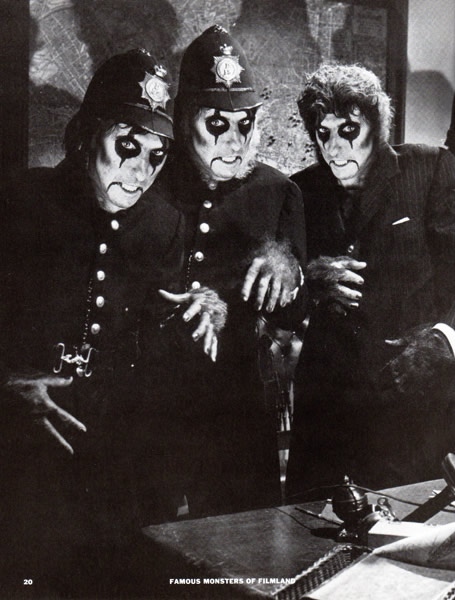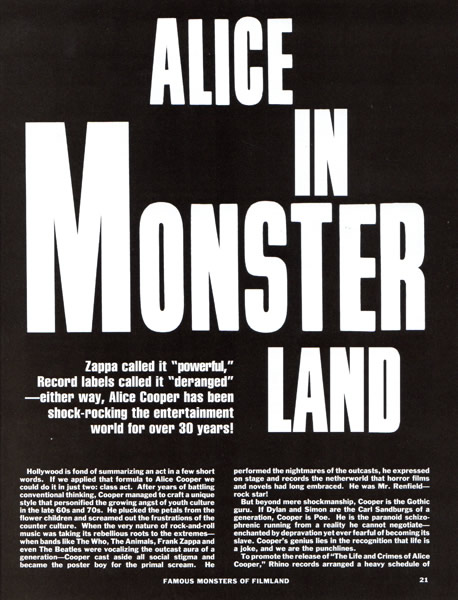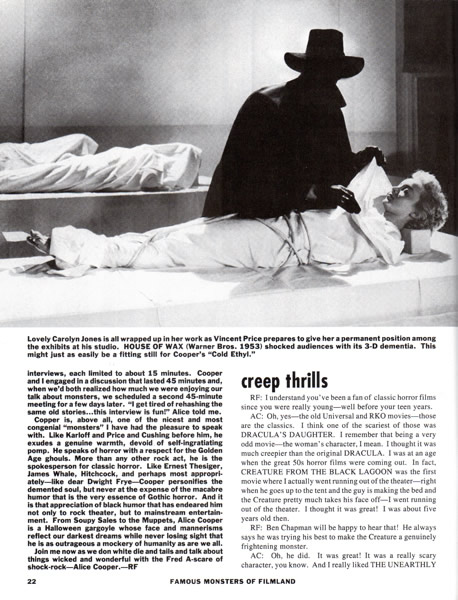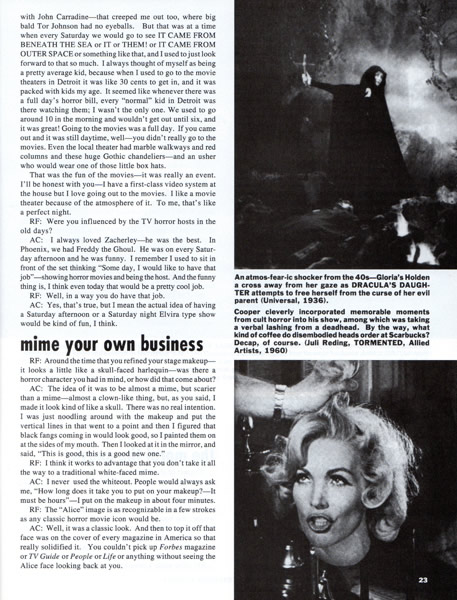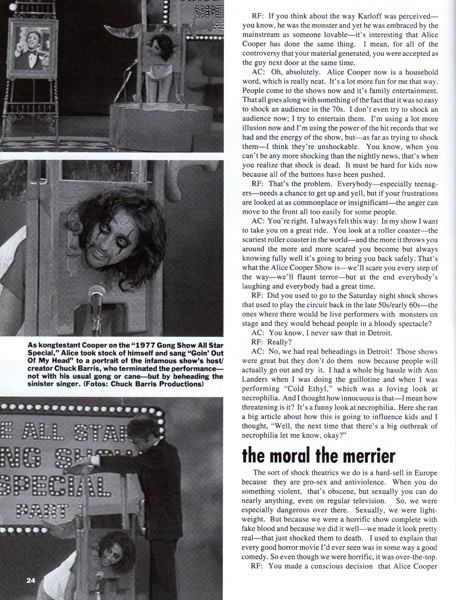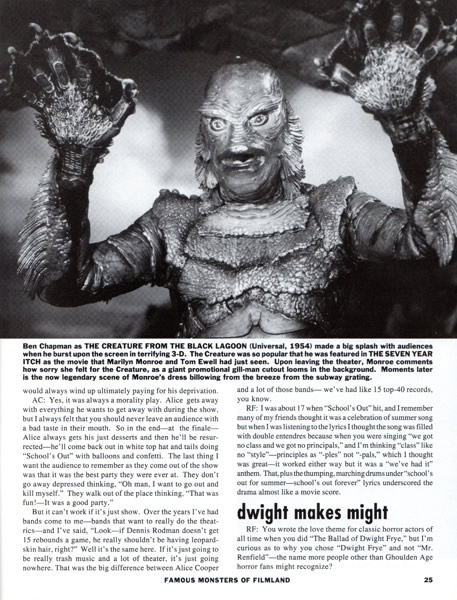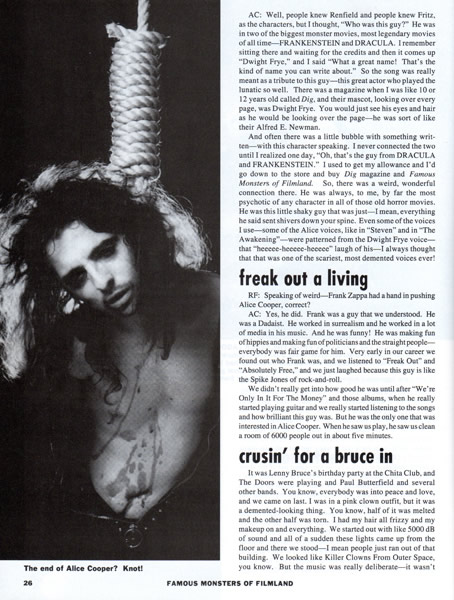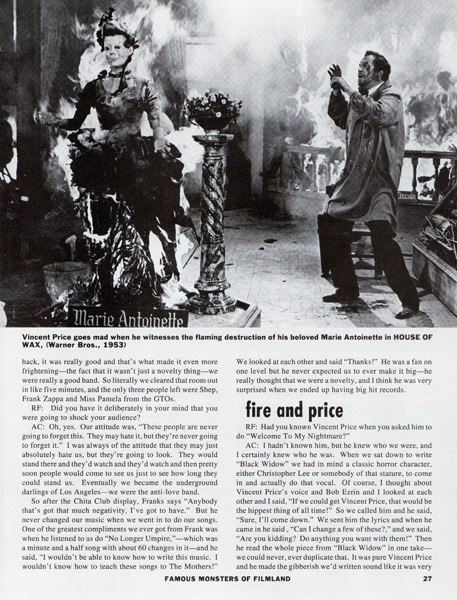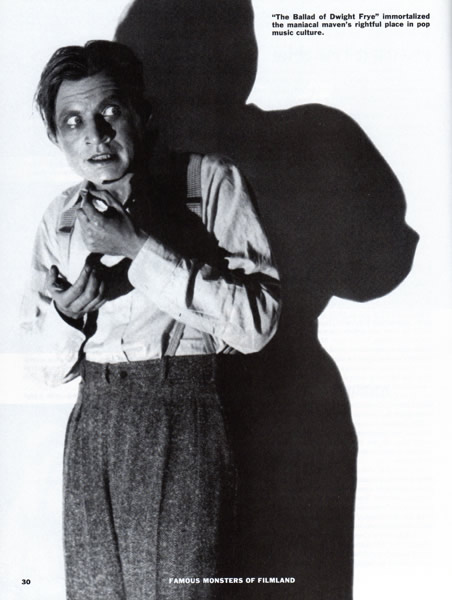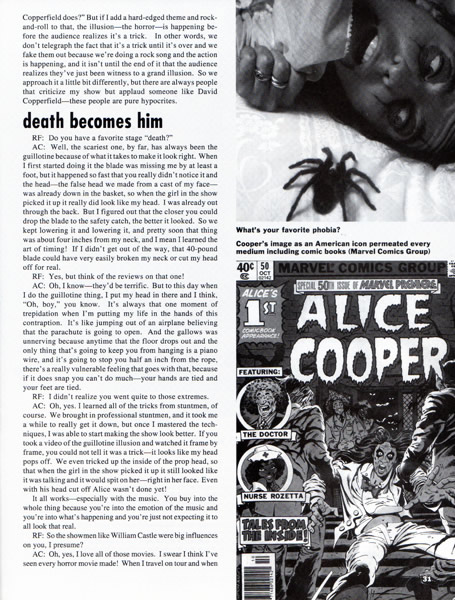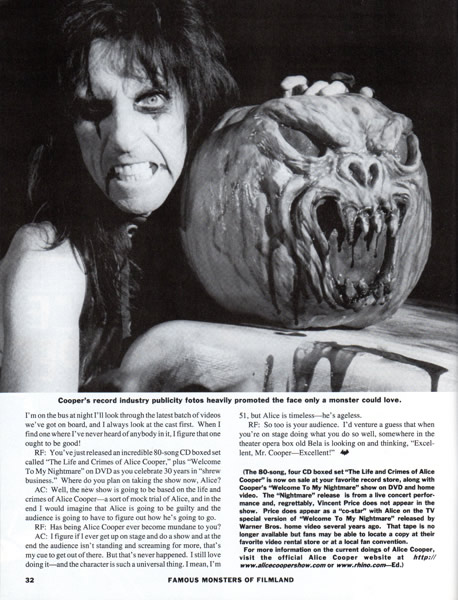Article Database

Famous Monsters
August 1999
Alice in Monsterland
Zappa called it "powerful", Record labels called it "deranged" - either way, Alice Cooper has been shock-rocking the entertainment world for over 30 years!
Hollywood is fond of summarizing an act in a few short words. If we applied that formula to Alice Cooper we could do it in just two words: class act. After years of battling conventional thinking, Cooper managed to craft a unique style that personified the growing angst of youth culture in the late 60s and 70s. He plucked the petal from the flower children and screamed out the frustration of the counter culture. When the very nature of rock-and-roll music was taking it rebellious roots to extremes - when bands like The Who, The Animals, Frank Zappa and even The Beatles were vocalizing the outcast aura of a generation - Cooper cast aside all the social stigma and became the poster boy for the primal scream. He performed the nightmares of the outcasts, he expressed on stage the records the netherworld that horror films and novels had long embraced. He was Mr. Renfield - rock star!
But beyond mere shockmanship, Cooper is the Gothic guru. If Dylan and Simon are the Carl Sandburgs of a generation, Cooper is Poe. He is the paranoid schizophrenic running from a reality he cannot negotiate - enchanted by depravation yet ever fearful of becoming its slave. Cooper's genius lies in the recognition that life is a joke, and we are the punchlines.
To promote the release of "The Life and Crimes of Alice Cooper," Rhino records arranged a heavy schedule of interviews, each limited to about 15 minutes. Cooper and I engaged in a discussion that lasted 45 minutes and, when we'd both realized how much we were enjoying our talk about monsters, we scheduled a second 45-minute meeting a few days later. "I get tired of rehashing the same old stories. This interview is fun!" Alice told me.
Cooper is, above all, one of the nicest and most congenial "monsters" I have had the pleasure to speak with. Like Karloff and Price and Cushing before him, he exudes genuine warmth, devoid of self-ingratiating pomp. He speaks of horror with a respect for the Golden Age ghouls. More than any other rock act, he is the spokesperson for classic horror. Like Ernest Thesiger, James Whale, Hitchcock, and perhaps most appropriately - like dear Dwight Frye - Cooper personifies the demented soul, but never at the expense of the macabre humor that is the very essence of Gothic horror. And it is that appreciation of black humor that has endeared him not only to rock theater, but to mainstream entertainment. From Soupy Sales to the Muppets, Alice Cooper is a Halloween gargoyle whose face and mannerisms reflect our darkest dreams while never losing sight that he is as outrageous a mockery of humanity as are we all.
Join me now as we don white die and tails ad talk about things wicked and wondeful and the Fred A-scare of shock-rock - Alice Cooper. - RF
Creep Thrills
I understand you've been a fan of classic horror films since you were really young - well before your teen years.
Oh yes - the old Universal and RKO movies - those are the classics. I think one of the scariest of those was DRACULA'S DAUGHTER. I remember that being a very odd movie - the woman's character, I mean. I thought it was much creepier than the original DRACULA. I was at an age when the great 50s horror films were coming out. In fact, CREATURES FROM THE BLACK LAGOON was the first movie where I actually went running out of the theater - right when he goes up to the tent and the guy is making the bed and the Creature pretty much takes his face off - I went running out of the theater. I thought it was great! I was about five years old then.
Ben Chapman will be happy to hear that! He always says he was trying his best to make the Creature a genuinely frightening monster.
Oh, he did. It was great! It was a really scary character, you know. And I really liked THE UNEARTHLY with John Carradine - that creeped me out too, where big bald Tor Johnson had no eyeballs. But that was at a time when every Saturday we would go to see IT CAME FROM BENEATH THE SEA or IT or THEM! or IT CAME FROM OUTER SPACE or something like that, and I used to just look forward to that so much. I always thought of myself as being a pretty average kid, because when I used to go to the movie theaters in Detroit it was like 30 cents to get in, and it was packed with kids my age. It seemed like whenever there was a full day's horror bill, every "normal" kid in Detroit was there watching them; I wasn't the only one. We used to go around 10 in the morning and wouldn't get out until six, and it was great! Going to the movies was a full day. If you came out and it was still daytime, well - you didn't really go to the movies. Even the local theater had marble walkways and red columns and these huge Gothic chandeliers - and an usher who would wear one of those little box hats.
That was the fun of the movies - it was really an event. I'll be honest with you - I have a first-class video system at the house but I love going out to the movies. I like a movie theater because of the atmosphere of it. To me, that's like the perfect night.
Were you influenced by the TV horror hosts in the old days?
I always loved Zacherley - he was the best. In Phoenix, we had Freddy the Ghoul. He was on every Saturday afternoon and he was funny. I remember I used to sit in front of the set thinking "Some day, I would like to have that job" - showing horror movies and being the host. And the funny thing is, I think even today that would be a pretty cool job.
Well, in a way you do have that job.
Yes, that's true, but I mean the actual idea of having a Saturday afternoon or evening Elvira type show would be kind of fun, I think.
Mime Your Own Business
Around the time that you refined your stage makeup - it looks a little like a skull faced harlequin - was there a horror character you had in mind, or how did that come about?
The idea of it was to be almost a mime, but scarier than a mime - almost a clown-like thing, but, as you said, I made it look kind of like a skull. There was no real intention. I was just noodling around with the makeup and put the vertical lines in that went to a point and then I figured that black fangs coming in would look good, so I painted them on at the sides of my mouth. Then I looked at it in the mirror, and said, "This is good, this is a good new one."
I think it works to advantage that you don't take it all the way to a traditional white-faced mime.
I never used the whiteout. People would always ask me, "How long does it take you to put on your makeup? - It must be hours" - I put on my makeup in about four minutes.
The "Alice" image is as recognizable in a few strokes as any classic horror movie icon would be.
Well, it was a classic look. And then to top it off that face was on the cover of every magazine in America so that really solidified it. You couldn't pick up Forbes magazine or TV Guide or People or Life or anything without seeing the Alice face looking back at you.
If you think about it the way Karloff was perceived - you know, he was the monster and yet he was embraced by the mainstream as someone lovable - it's interesting that Alice Cooper has done the same thing. I mean, for all of the controversy that your material generated, you were accepted as the guy next door at the same time.
Oh, absolutely. Alice Cooper is now a household word, which is really neat. It's a lot more fun for me that way. People come to the shows now and it's family entertainment. That all goes along with something of the fact that it was so easy to shock an audience in the 70s. I don't even try to shock an audience now; I try to entertain them. I'm using a lot more illusion now and I'm using the power of the hit records that we had and the energy of the show, but - as far as trying to shock them - I think they're unshockable. You know, when you can't be any more shocking than the nightly news, that's when you realize that shock is dead. It must be hard for kids now because all of the buttons have been pushed.
That's the problem. Everybody - especially teenagers - needs a chance to get up and yell, but if your frustrations are looked at as commonplace or insignificant - the anger can move to the front all too easily for some people.
You're right. I always felt this way: In my show I want to take you on a great ride. You look at a roller coaster - the scariest roller coaster in the world - and the more it throws you around the more and more scared you become but always knowing full well it's going to bring you back safely. That's what the Alice Cooper Show is - we'll flaunt terror - but at the end everybody's laughing and everybody had a great time.
Did you used to go to the Saturday night shock shows that used to play the circuit back in the late 50s/early 60s - the ones where there would be live performers with monsters on the stage and they would behead people in a bloody spectacle?
You know, I never saw that in Detroit.
Really?
No, we had real beheadings in Detroit! Those show were great but they don't do them now because people will actually go out and try it. I had a whole big hassle with Ann Landers when I was doing the guillotine and when I was performing "Cold Ethyl," which was a loving look at necrophilia. And I thought how innocuous is that - I mean how threatening is that? It's a funny look at necrophilia. Here she ran a big article about how this was going to influence kids and I thought, "Well, the next time that there's a big break out of necrophilia let me know, okay?"
The Moral the Merrier
The sort of shock theatrics we do is a hard-sell in Europe because they are so pro-sex and antiviolence. When you do something violent, that's obscene, but sexually you can do nearly anything, even on regular television. So, we were especially dangerous over there. Sexually, we were lightweight. But because we were a horrific show complete with fake blood and because we did it well - we made it look pretty real - that just shocked them to death. I used to explain that every good horror movie I'd ever seen was in some way a good comedy. So even though we were horrific, it was over-the-top.
You made a conscious decision that Alice Cooper would always wind up ultimately paying for his deprivation.
Yes, it was always a morality play. Alice gets away with everything he wants to get away with during the show, but I always felt that you should never leave the audience with a band taste in their mouth. So in the end - at the finale - Alice always gets his just desserts and then he'll be resurrected - he'll come back out in white top hat and tails doing "School's Out" with ballons and confetti. The last thing I want the audience to remember as they come out of the show was that it was the best party they were ever at. They don't go away depressed thinking, "Oh man, I want to go out and kill myself." They walk out of the place thinking, "That was fun! - It was a good party."
But it can't work if it's just a show. Over the years I've had bands come to me - bands that want to really do the theatrics - and I've said, "Look - if Dennis Rodman doesn't get 15 rebounds a game, he really shouldn't be having leopard-skin hair, right?" Well it's the same here. If it's just going to be really trashy music and a lot of theater, it's just going nowhere. That was the big difference between Alice Cooper and a lot of those bands - we've had like 15 top-40 records, you know.
I was about 17 when "School's Out" hit, and I remember many of my friends thought it was a celebration of summer song but when I was listening to the lyrics I thought the song was filled with double entendres because when you were singing "we got no class and we got no principles," and I'm thinking "class" like no "style" - principals as "-ples" not "-pals," which I thought was great - it worked either way but it was a "we've had it" anthem. That, plus the thumping, marching, drums under "school's out for summer - school's out forever" lyrics underscored the drama almost like a movie score.
Dwight Makes Might
You wrote the love theme for classic horror actors of all time when you did "The Ballad of Dwight Frye," but I'm curious as to why you chose "Dwight Frye" and not "Mr. Renfield" - the name more people other than Ghoulden Age horror fans might recognize?
Well, people knew Renfield and people knew Fritz. , as the characters, but I thought, "Who was this guy?" He was in two of the biggest monster movies, most legendary movies of all time - FRANKENSTEIN and DRACULA. I remember sitting there and waiting for the credits and then it came up "Dwight Frye," and I said "What a great name! That's the kind of name you can write about." So the song was really meant as a tribute to this guy - this great actor who played the lunatic so well. There was a magazine when I was like 10 or 12 years old called Dig, and their mascot, lookingover every page, was Dwight Frye. You could just see his eyes and hair as he would be looking over the page - he was sort of like their Alfred E. Newman.
And often there was a little bubble with something written - with his character speaking. I never connected the two until I realized one day, "Oh, that's the guy from DRACULA and FRANKENSTEIN." I used to get my allowance and I'd go down to the store and buy Dig magazine and Famous Monsters of Filmland. So, there was a weird, wonderful connection there. He was always, to me, by far the most psychotic of any character in all of those old horror movies. He was this little shaky guy that was just - I mean, everything he said sent shivers down your spine. Even some of the voices I use - some of the Alice voices, like in "Steven" and in "The Awakening" - were patterned from the Dwight Frye voice - that "heeee-heeeee-heeee" laugh of his - I always though that that was one of the scariest, most demented voices ever.
Freak Out A Living
Speaking of something weird - Frank Zappa had a hand in pushing Alice Cooper, correct?
Yes, he did. Frank was a guy that we understood. He was a Dadaist. He worked in surrealism and he worked in a lot media in his music. And he was funny! He was making fun of hippies and making fun of politicians and the straight people - everybody was fair game to him. Very early in our career we found out who Frank was, and we listened to "Freak Out" and "Absolutely Free", and we just laughed because this guy is like the Spike Jones of rock-and-roll.
We didn't really get into how good he was until after "We're Only In It For The Money" and those albums, when he really started playing guitar and we really started listening to the songs and how brilliant this guy was. But he was the only one that was interested in Alice Cooper. When he saw us play, he saw us clean a room of 6000 people out in about five minutes.
Cruisin' For A Bruce In
It was Lenny Bruce's birthday party at the Chita Club, and The Doors were playing and Paul Butterfield and several other bands. You know, everybody was into peace and love, and we came on last. I was in a pink clown outfit, but it was a demented-looking thing. You know, half of it was melted and the other half torn. I had my hair frizzy and my makeup on and everything. We started out with like 5000 dB of sound and all of a sudden these lights came up from the floor and there we stood - I mean people just ran out of that building. We looked like Killer Clowns From Outer Space, you know. But the music was really deliberate - it wasn't hack, it was really good and that's what made it even more frightening - the fact that it wasn't just a novelty thing - we were really a good band. So literally we cleared that room out in like five minutes, and the only three people left were Shep, Frank Zappa and Miss Pamela from the GTOs.
Did you have it deliberately in your mind that you were going to shock your audience?
Oh, yes. Our attitude was, "These people are never going to forget this. They may hate it, but they're never going to forget it." I was always of the attitude that they may just absolutely hate us, but they're going to look. They would stand there and they'd watch and they'd watch and then pretty soon people would come to see us just to see how long they could stand us. Eventually we became the underground darlings of Los Angeles - we were the anti-love band.
So after the Chita Club display, Frank says "Anybody that's got that much negativity, I've got to have." But he never changed our music when we went in to do our songs. One of the greatest compliments we ever got from Frank was when he listened to us do "No Longer Umpire," - which was a minute and a half song with about 60 changes in it - and he said, "I wouldn't be able to know how to write this music. I wouldn't know how to teach these songs to The Mothers!"
We looked at each other and said "Thanks!" He was a fan on one level but he never expected us to make it big - he really thought that we were a novelty, and I think he was very surprised when we ended up having big hit records.
Fire and Price
Had you known Vincent Price when you asked him to do "Welcome To My Nightmare?"
I hadn't known him, but he knew who we were, and I certainly knew who he was. When we sat down to write "Black Widow" we had in mind a classic horror character, either Christopher Lee or somebody of that stature, to come in and actually do that vocal. Of course, I thought of Vincent Price's voice and Bob Ezrin and I looked at each other and I said, "If we could get Vincent Price, that would be the hippest thing of all time!" So we called him and he said, "Sure, I'll come down." We sent him the lyrics and when he came in he said, "Can I change a few of these?," and we said, "Are you kidding? Do anything you want with them!" Then he read the whole piece from "Black Widow" in one take - we could never, ever duplicate that. It was pure Vincent Price and he made the gibberish we'd written sound like it was very important!
He was really a lot of fun - I mean we really had a great time with him. He was so funny. And then we did the piece live with him, too. In Lake Tahoe we played the Sahara Hotel and Vincent Price performed with us. When it came to "Black Widow" the spotlight went on him and he did the whole dialogue from this balcony - it was the classiest thing we ever did.
Did you follow that up? Did you get to know him?
Oh, yes. He came over and cooked for us one night. He came over and made caviar crepes. I saw him every once in a while and we were always on very good terms.
"Thriller" got a lot of attention because of its theatrical release but "Welcome To My Nightmare" was the groundbreaker, wasn't it?
I'll tell you, Michael Jackson writes some awfully good songs. I would call him the Fred Astaire of rock-and-roll - nobody can dance like that. His act is polished and I applaud what he does because he is amazing on stage. And as far as video's go, he's made some classics; he spends a lot of money making them, but I never saw anything real scary about "Thriller." When we did "Welcome To My Nightmare," it was designed to be scary.
It is. Even in the version that was obviously toned down for television, I get the jitters from watching those dancers in the spider costumes crawling all over that giant web! There's something very eerie about the look of it.
One of my favorite clips is the one of you with Soupy Sales, doing the circus bit with White Fang and the spider.
Oh, yes! I grew up with Soupy - I lived in Detroit and when Soupy was on I was seven or eight years old, and I used to come home and have lunch with Soupy Sales. I mean, (OOH - OOH - OOOOH! Growl sounds). I grew up with White Fang and Black Tooth - they were great, weren't they?!
I remember White Fang counting out a wad of bills when he was paying off a bet to Soupy and Soupy says, "Where'd my doggie get all dat money?" Frank Nastasi and Soupy were unreal.
I still laugh my head off when I see old Soupy Sales things. The guys at the door, Pookie - remember? The little puppet that used to come up in the window - I loved that!
How did you wind up on the show?
He called us. You know, it was a privilege to get hit with a pie from Soupy because Frank Sinatra just got hit with a pie the week before. So when he called and said, "Would you come in and get hit with a pie?" I said, "Oh, man, that's like getting a star on Hollywood Boulevard."
How did you react to all the mainstream acceptance? I mean, one minute you're this major band that the media is throwing rock at left and right, and the next you're with Miss Piggy and the Muppets, you're with Soupy Sales - you're on "The Gong Show" -
I knew we had arrived when Bob Hope was making jokes about us on one of his Christmas specials. That's when you know when you're a household word, when you're an answer on "Jeopardy" or you're in the New York Times crossword puzzle or when Bob Hope starts making jokes about you; that's when you know you're absolutely as much a household word as Coca-Cola, because Hope wouldn't tell a joke unless he thought that 90% of the people would know who he was talking about. I always tried to put Alice in places where he didn't belong and I still do. I always like to inject Alice as an American icon into places where he just shouldn't be. It was kind of like the cat in the birdcage, you know. I knew that we won, and I knew that all of the people that had really doubted our appeal were thinking "I don't believe this." In the back of my mind, every time I did a "mainstream" show I was rubbing it in a little more, you know?
I Crossed The Line
Can you account for why Alice Cooper should have become so acceptable over a lot of other "counterculture" acts?
Well, I think that we crossed the line between rock-and-roll and show biz to where everybody could enjoy the show. It was rock-and-roll to the teeth, but it was also show biz to the teeth, and people that were in the theater - people like Paul Newman, Fred Astaire, Mae West, Groucho Marx - nearly every major actor in Hollywood came to an Alice Cooper show - not just for the music but for its theatrics and how it was done, and they were realizing that they were seeing something that had never been done before. So, to anybody who was a student of the theater, they appreciated the potency of the act. Even if you didn't like the music it was impossible not to like the show. It's like Cirque du Soleil - no matter what your tastes might be, it's impossible not to like that show.
You can go to one of your shows and see similar types of things that the movies - that contemporary horror films - would play on, yet there's much more condemnation of violence in movies than shock-rock theater. Why do you think that is?
I think it's because theater has more history than movies do - that theater is thought of as much more legit than movies. If you do something controversial live in front of an audience and it's done with lighting and it's done with purpose and it's entertaining, people will be more tolerant - when you say "theater," you're suddenly saying something that's considered acceptable.
If I were David Copperfield up there, going into a sarcophagus and all of these demented clowns were putting swords through it and then suddenly one of the clowns is me, people would be saying, "Isn't that amazing what David Copperfield does?" But if I add a hard-edge theme and rock-and-roll to that, the illusion - the horror - is happening before the audience realizes it's a trick. In other words, we don't telegraph the fact that it's a trick until it's over and we fake them out because we're doing a rock song and the action is happening, and it isn't until the end of it that the audience realizes they've just been witness to a grand illusion. So we approach it a little bit differently, but there are always people who criticize my show but applaud someone like David Copperfield - these people are pure hypocrites.
Death Becomes Him
Do you have a favorite stage "death"?
Well, the scariest one, by far, has always been the guillotine because of what it takes to make it look right. When I first started doing it the blade was missing me by at least a foot, but it happened so fast that you really didn't notice it and the head - the false head we made from a cast of my face - was already down in the basket, so when the girl in the show picked it up it really did look like my head. I was already out through the back. But I figured out that the closer you could drop the blade to the safety catch, the better it looked. So we kept lowering it and lowering it, and pretty soon that thing was about four inches from my neck, and I mean I learned the art of timing! If I didn't get out of the way, that 40-pound blade could have very easily broken my neck or cut my head off for real.
Yes, but think of the reviews on that one!
Oh, I know - they'd be terrific. But to this day when I do the guillotine thing, I put my head in there and I think, "Oh, boy," you know. It's always that moment of trepidation when I'm putting my life in the hands of this contraption. It's like jumping out of an airplane believing that the parachute is going to open. And the gallows was unnerving because anytime that the floor drops out and the only thing that's going to keep you from hanging is a piano wire, and it's going to stop you half an inch from the rope, there's a really vulnerable feeling that goes with that, because if it does snap you can't do much - your hands are tied and your feet are tied.
I didn't realize you went quite to those extremes.
Oh, yes. I learned all the tricks from stuntmen, of course. We brought in professional stuntmen, and it took me a while to really get it down, but once I mastered the techniques, I was able start making the show look better. If you took a video of the guillotine illusion and watched it frame by frame, you could not tell it was a trick - it looks like my head pops off. We even tricked up the inside of the prop head, so that when the girl in the show picked it up it still looked like it was talking and it would spit on her - right in her face. Even with his head cut off Alice wasn't done yet!
It all works - especially with music. You buy into the whole thing because you're into the emotion of the music and you're into what's happening and you're just not expecting it to all look that real.
So the showmen like William Castle were big influences on you, I presume?
Oh, yes, I love all those movies. I swear I think I've seen every horror movie made! When I travel on tour and when I'm on the bus at night I'll look through the latest batch of videos we've got on board, and I always look at the cast first. When I find one where I've never heard of anybody on it, I figure that one ought to be good!
You've just released an incredible 80-song CD boxed set called "The Life and Crimes of Alice Cooper," plus "Welcome To My Nightmare" on DVD as you celebrate 30 years in "shrew business". Where do you plan on taking the new show now, Alice?
Well, the new show is going to be based on the life and crimes of Alice Cooper - a sort of mock trial of Alice, and in the end I would imagine that Alice is going to be guilty and the audience is going to have to figure out how he's going to go.
Has being Alice Cooper ever become mundane to you?
I figure if I ever get up on stage and do a show and at the end the audience isn't standing and screaming for more, that's my cue to get out of there. But that's never happened. I still love doing it - and the character is such a universal thing. I mean, I'm 51, but Alice is timeless - he's ageless.
So too is your audience. I'd venture a guess that when you're on stage doing what you do so well, somewhere in the theater opera box old Bela is looking on and thinking, "Excellent, Mr. Cooper - Excellent!"
(The 80-song, four CD-boxed set "The Life and Crimes of Alice Cooper" is now on sale at your favorite record store, along with Cooper's "Welcome To My Nightmare" show on DVD and home video. The "Nightmare" release is from a live concert performance and, regrettably, Vincent Price does not appear in the show. Price does appear as a "co-star" with Alice on the TV special version of "Welcome To My Nightmare" released by Warner Bros. Home video several years ago. That tape is no longer available but fans may be able to locate a copy at their favorite video rental store or at a local fan convention.
For more information on the current doings of Alice Cooper, visit the official Alice Cooper website at http://www.alicecoopershow.com or www.rhino.com - Ed)




